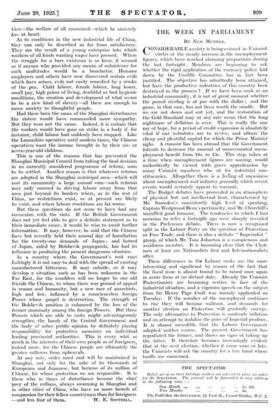THE WEEK IN PARLIAMENT
By NEW MEMBER.
CONSIDERABLE anxiety is being evinced in Unionist circles at the steady increase in the unemployment figures, which have reached alarming proportions during the last fortnight. Members are beginning to ask whether the rigid application of the currency policy laid down by the Cunliffe Committee has in fact been justified. The objective has admittedly been attained, but have the productive industries of this country been destroyed in the process ? If we have been sunk as an industrial community, it is not of great moment whether the pound sterling is at par with the dollar ; and the game, in that case, has not been worth the candle. But we are not down and out yet, and the restoration of the Gold Standard may at any rate mean that the long nightmare of deflation is over. This is really the one ray of hope, for a period of credit expansion is absolutely vital if our industries are to revive, and obtain the cheap and plentiful capital for which the Prime Minister sighs. A rumour has been abroad that the Government intends to decrease the amount of uncovenanted unem- ployment benefit from 18s. to 15s. This step, taken at a time when unemployment figures are soaring, would undoubtedly be viewed with grave apprehension by many Unionist members who sit for industrial con- stituencies. Altogether there is a feeling of uneasiness about unemployment and industry generally which recent events would certainly appear to warrant.
The Budget debates have proceeded in an atmosphere of physical but not intellectual heat, characterized by Mr. Snowden's consistently high level of speaking, Captain Wedgwood Benn's pertinacity, and Mr. Churchill's unruffled good humour. The tendencies to which I had occasion to refer a fortnight ago were sharply revealed in the Preference debate. There is now a recognized split in the Labour Party on the question of Protection or Free Trade, and there is also a definite " Imperialist " group, of which Mr. Tom Johnston is a conspicuous and assiduous member. It is becoming clear that the Clyde men at least are Nationalists first and Internationalists after.
These differences in the Labour ranks are the more interesting and significant by reason of the fact that the fiscal issue is almost bound to be raised once again in acute form at no distant date. Already the Unionist Protectionists are becoming restive in face of the industrial situation, and a vigorous speech on the subject from Sir Henry Page Croft was warmly applauded on Tuesday. If the number of the unemployed continues to rise they will become militant, and demands for another election on Protection will gradually emerge. The only alternative to Protection is moderate inflation and an attempt to stabilize the price of Imperial produce. It is almost incredible that the Labour Government adopted neither course. The present Government has repudiated the former, and shows no signs of taking up the latter. It therefore becomes increasingly evident that at the next election, whether it come soon or late, the Unionists will ask the country for a free hand where tariffs are concerned.










































 Previous page
Previous page